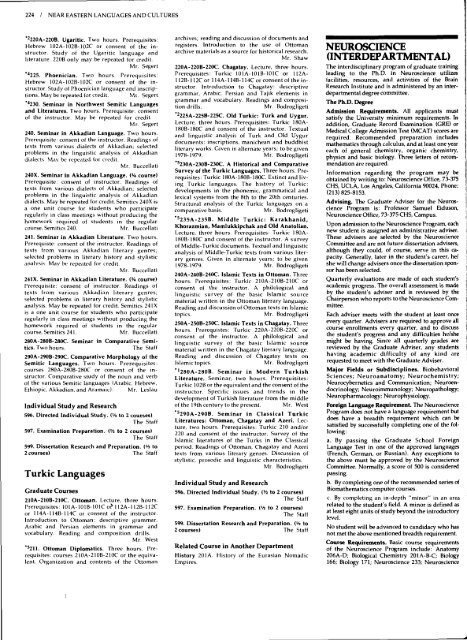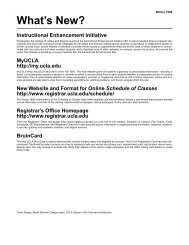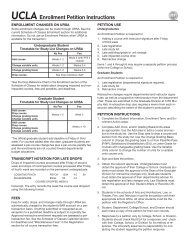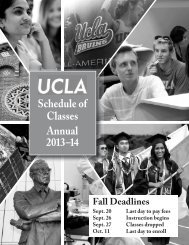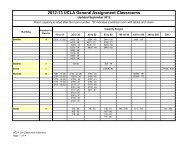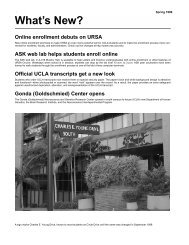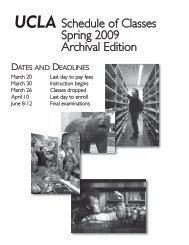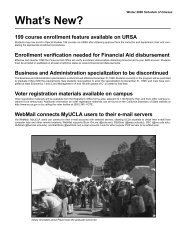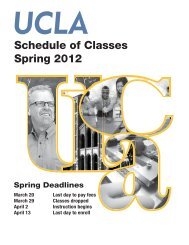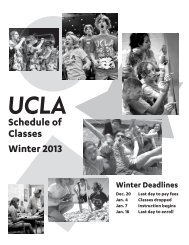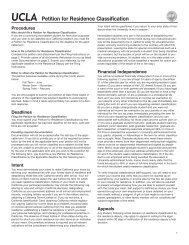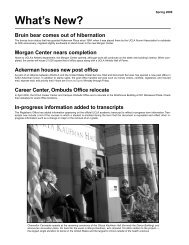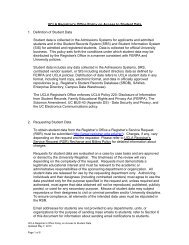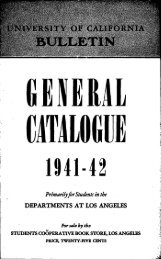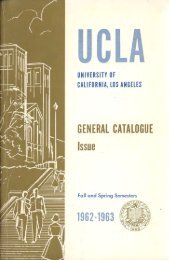UCLA Graduate Catalog 1980-81 - Registrar - UCLA
UCLA Graduate Catalog 1980-81 - Registrar - UCLA
UCLA Graduate Catalog 1980-81 - Registrar - UCLA
You also want an ePaper? Increase the reach of your titles
YUMPU automatically turns print PDFs into web optimized ePapers that Google loves.
224 / NEAR EASTERN LANGUAGES AND CULTURES<br />
*2220A- 220B. Ugaritic . Two hours. Prerequisites:<br />
Hebrew 102A-102B-102C or consent of the instructor.<br />
Study of the Ugaritic language and<br />
literature. 2206 only may be repeated for credit.<br />
Mr. Segert<br />
4225. Phoenician . Two hours. Prerequisites:<br />
Hebrew 102A-1028-102C or consent of the instructor.<br />
Study of Phoenician language and inscriptions.<br />
May be repeated for credit. Mr. Segert<br />
4230. Seminar in Northwest Semitic Languages<br />
and Literatures . Two hours. Prerequisite: consent<br />
of the instructor. May be repeated for credit.<br />
Mr. Segert<br />
240. Seminar in Akkadian Language . Two hours.<br />
Prerequisite: consent of the instructor. Readings of<br />
texts from various dialects of Akkadian; selected<br />
problems in the linguistic analysis of Akkadian<br />
dialects. May he repeated for credit.<br />
Mr. Buccellati<br />
240X. Seminar in Akkadian Language. (1/4 course)<br />
Prerequisite: consent of instructor. Readings of<br />
texts from various dialects of Akkadian; selected<br />
problems in the linguistic analysis of Akkadian<br />
dialects. May be repeated for credit. Semitics 240X is<br />
a one unit course for students who participate<br />
regularly in class meetings without producing the<br />
homework required of students in the regular<br />
course, Semitics 240. Mr. Buccellati<br />
241. Seminar in Akkadian Literature . Two hours.<br />
Prerequiste: consent of the instructor. Readings of<br />
texts from various Akkadian literary genres;<br />
selected problems in literary history and stylistic<br />
analvsis. May be repeated for credit.<br />
Mr. Buccellati<br />
241X. Seminar in Akkadian Literature . (1/4 course)<br />
Prerequisite: consent of instructor. Readings of<br />
texts from various Akkadian literary genres;<br />
selected problems in literary history and stylistic<br />
analysis. May be repeated for credit. Semitics 241X<br />
is a one unit course for students who participate<br />
regularly in class meetings without producing the<br />
homework required of students in the regular<br />
course, Semitics 241. Mr. Buccellati<br />
280A - 280B - 280C . Seminar in Comparative Semitics<br />
. Two hours. The Staff<br />
290A- 2908 -290C. Comparative Morphology of the<br />
Semitic Languages . Two hours. Prerequisites:<br />
courses 280A-2808-280C or consent of the instructor.<br />
Comparative study of the noun and verb<br />
of the various Semitic languages (Arabic, Hebrew,<br />
Ethiopic, Akkadian, and Aramaic). Mr. Leslau<br />
Individual Study and Research<br />
596. Directed Individual Study. (1h to 2 courses)<br />
The Staff<br />
597. Examination Preparation . (1h to 2 courses)<br />
The Staff<br />
599. Dissertation Research and Preparation . (1/r to<br />
2 courses ) The Staff<br />
Turkic Languages<br />
<strong>Graduate</strong> Courses<br />
210A - 2108 -210C. Ottoman . Lecture, three hours.<br />
Prerequisites: 101A-10113-101C o? I l2A-1128-112C<br />
or 114A-114B-114C or consent of the instructor.<br />
Introduction to Ottoman: descriptive grammar,<br />
Arabic and Persian elements in grammar and<br />
vocabulary. Reading and composition drills.<br />
Mr. West<br />
"5211. Ottoman Diplomatics . Three hours. Prerequisites:<br />
courses 210A-2106-210C or the equivalent.<br />
Organization and contents of the Ottoman<br />
archives; reading and discussion of documents and<br />
registers. Introduction to the use of Ottoman<br />
archive materials as a source for historical research.<br />
Mr. Shaw<br />
220A - 220B - 220C. Chagatay . Lecture, three hours.<br />
Prerequisites: Turkic 101A-1016-101C or 112A-<br />
112B-112C or 114A-114B-114C or consent of the instructor.<br />
Introduction to Chagatay: descriptive<br />
grammar, Arabic, Persian and Ta(ik elements in<br />
grammar and vocabulary. Readings and composition<br />
drills. Mr. Bodrogligeti<br />
*2225A - 225B-225C. Old Turkic : Turk and Uygur.<br />
Lecture, three hours. Prerequisites: Turkic 180A-<br />
18OB-180C and consent of the instructor. Textual<br />
and linguistic analysis of Turk and Old Uygur<br />
documents: inscriptions, manichean and buddhist<br />
literary works. Given in alternate years; to be given<br />
1978-1979. Mr. Bodrogligeti<br />
*5230A- 23OB- 2300 . A Historical and Comparative<br />
Survey of the Turkic Languages . Three hours. Prerequisites:<br />
Turkic 180A-180B-180C. Extinct and living<br />
Turkic languages. The history of Turkic:<br />
developments in the phonemic, grammatical and<br />
lexical systems from the 8th to the 20th centuries.<br />
Structural analysis of the Turkic languages on a<br />
comparative basis. Mr. Bodrogligeti<br />
*5235A - 235B . Middle Turkic: Karakhanid,<br />
Khorazmian , Mamlukkipchak and Old Anatolian.<br />
Lecture, three hours. Prerequisites: Turkic 180A-<br />
180B-1800 and consent of the instructor. A survey<br />
of Middle-Turkic documents. Textual and linguistic<br />
analysis of Middle-Turkic texts from various literary<br />
genres. Given in alternate years; to be given<br />
1978-1979. Mr. Bodrogligeti<br />
240A - 240B - 2400 . Islamic Texts in Ottoman. Three<br />
hours. Prerequisites: Turkic 210A-210B-210C or<br />
consent of the instructor. A philological and<br />
linguistic survey of the basic Islamic source<br />
material written in the Ottoman literary language.<br />
Reading and discussion of Ottoman texts on Islamic<br />
topics. Mr. Bodrogligeti<br />
250A - 2508 -2500. Islamic Texts in Chagatay. Three<br />
hours. Prerequistes: Turkic 220A-220B-220C or<br />
consent of the instructor. A philological and<br />
linguistic survey of the basic Islamic source<br />
material written in the Chagatay literary language.<br />
Reading and discussion of Chagatay texts on<br />
Islamic topics. Mr. Bodrogligeti<br />
*1280A - 280B . Seminar in Modern Turkish<br />
Literature . Seminar, two hours. Prerequisites:<br />
Turkic 1026 or the equivalent and the consent of the<br />
instructor. Specific issues and trends in the<br />
development of Turkish literature from the middle<br />
of the 19th century to the present. Mr. West<br />
*5290A - 290B . Seminar in Classical Turkic<br />
Literatures : Ottoman, Chagatay and Azeri. Lecture,<br />
two hours. Prerequisites: Turkic 210 and/or<br />
220 and consent of the instructor. Survey of the<br />
Islamic literatures of the Turks in the Classical<br />
period. Readings of Ottoman, Chagatay and Azeri<br />
texts from various literary genres. Discussion of<br />
stylistic, prosodic and linguistic characteristics.<br />
Mr. Bodrogligeti<br />
Individual Study and Research<br />
596. Directed Individual Study. (1h to 2 courses)<br />
The Staff<br />
597. Examination Preparation. (1h to 2 courses)<br />
The Staff<br />
599. Dissertation Research and Preparation. (1h to<br />
2 courses) The Staff<br />
Related Course in Another Department<br />
History<br />
Empires.<br />
201A. History of the Eurasian Nomadic<br />
NEUROSCIENCE<br />
(INTERDEPARTMENTAL)<br />
The interdisciplinary program of graduate training<br />
leading to the Ph.D. in Neuroscience utilizes<br />
facilities , resources, and activities of the Brain<br />
Research Institute and is administered by an interdepartmental<br />
degree committee.<br />
The Ph.D. Degree<br />
Admission Requirements . All applicants must<br />
satisfy the University minimum requirements. In<br />
addition, <strong>Graduate</strong> Record Examination (GRE) or<br />
Medical College Admission Test (MCAT) scores are<br />
required. Recommended preparation includes<br />
mathematics through calculus, and at least one year<br />
each of general chemistry, organic chemistry,<br />
physics and basic biology. Three letters of recommendation<br />
are required.<br />
Information regarding the program may be<br />
obtained by writing to: Neuroscience Office, 73-375<br />
CHS, <strong>UCLA</strong>, Los Angeles, California 90024, Phone:<br />
(213) 825-<strong>81</strong>53.<br />
Advising . The <strong>Graduate</strong> Adviser for the Neuroscience<br />
Program is: Professor Samuel Eiduson,<br />
Neuroscience Office, 73-375 CHS, Campus.<br />
Upon admission to the Neuroscience Program, each<br />
new student is assigned an administrative adviser.<br />
These advisers are selected by the Neuroscience<br />
Committee and are not future dissertation advisers,<br />
although they could, of course, serve in this capacity.<br />
Generally , later in the student' s career, he/<br />
she will change advisers once the dissertation sponsor<br />
has been selected.<br />
Quarterly evaluations are made of each student's<br />
academic progress. The overall assessment is made<br />
by the student's adviser and is reviewed by the<br />
Chairperson<br />
mittee.<br />
who reports to the Neuroscience Com-<br />
Each adviser meets with the student at least once<br />
every quarter. Advisers are required to approve all<br />
course enrollments every quarter, and to discuss<br />
the student's progress and any difficulties he/she<br />
might be having. Since all quarterly grades are<br />
reviewed by the <strong>Graduate</strong> Adviser, any students<br />
having academic difficulty of any kind are<br />
requested to meet with the <strong>Graduate</strong> Adviser.<br />
Major Fields or Subdisciplines . Biobehavioral<br />
Sciences; Neuroanatomy; Neurochemistry;<br />
Neurocybernetics and Communication; Neuroendocrinology;<br />
Neuroimmunology; Neuropathology;<br />
Neuropharmacology; Neurophysiology.<br />
Foreign Language Requirement . The Neuroscience<br />
Program does not have a language requirement but<br />
does have a breadth requirement which can be<br />
satisfied by successfully completing one of the following:<br />
a. By passing the <strong>Graduate</strong> School Foreign<br />
Language Test in one of the approved languages<br />
(French, German, or Russian ). Any exceptions to<br />
the above must be approved by the Neuroscience<br />
Committee. Normally, a score of 500 is considered<br />
passing.<br />
b. By completing one of the recommended series of<br />
Biomathematics computer courses.<br />
c. By completing an in-depth "minor" in an area<br />
related to the student's field. A minor is defined as<br />
at least eight units of study beyond the introductory<br />
level.<br />
No student will be advanced to candidacy who has<br />
not met the above mentioned breadth requirement.<br />
Course Requirements . Basic course requirements<br />
of the Neuroscience Program include: Anatomy<br />
206A-D; Biological Chemistry 201A-B-C; Biology<br />
166; Biology 171; Neuroscience 233; Neuroscience


